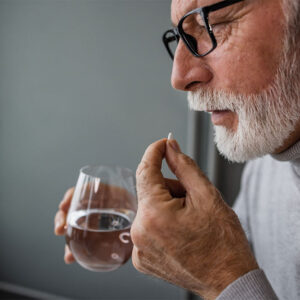
4 Must-Have Nutrients to Beat Osteoporosis
Brittle bones are a hallmark of aging. And when your bone density goes down, your risk of fractures goes up.
But it doesn’t have to be that way.
You can take steps to support your bone health as you get older.
This will help reduce your risk of osteoporosis—and more importantly — reduce your risk of suffering a life-altering fracture.
And it all starts with these 4 must-have nutrients.
Your bones are constantly going through a process where they’re broken down and rebuilt.
And as long as you’re rebuilding bone faster than they’re breaking down, you have nothing to worry about.
But that’s the problem…
As you get older, that balance shifts, and the rebuilding part slows down.
The result is reduced bone density, and porous, brittle bones.
The reason this is a problem is because it increases your risk of suffering a fracture, leading to a quality of life and a greater risk of dying prematurely.
Fortunately, you can take steps to help support the building new bone.
Here are a few of the most important nutrients for bone health. And as you’ll see, these nutrients interact with one another, which makes it essential to have adequate levels of all of them.
About 99 percent of your body’s calcium is stored in your bones, making it a key component of bone structure and strength.
In one study, taking calcium and vitamin D was associated with a 15-30 percent reduced risk of fractures in middle-aged and older adults.
That brings me to vitamin D.
The reason it is so important for your bone health is because it help your body absorb calcium.
If you’re getting plenty of calcium—but are deficient in vitamin D—your bones could still be at risk.
One study of older adults found that people with osteoporosis were more likely to be deficient in vitamin D.
However, when those people started supplementing with vitamin D, they were more likely to have a lower incidence of osteoporosis in just 8 weeks!
Boron is another “supporting actor” when it comes to bone health.
Boron is important for bone growth because it affects the use of other nutrients, like calcium, vitamin D, and magnesium (more on this last one in a minute).
One study of postmenopausal women found that taking 3mg of boron significantly reduced the amount of calcium and magnesium being excreted in the kidneys (meaning there was more left in their bones).
And a mouse study found that supplementing with boron significantly reduced bone loss.
To get more boron in your diet, start snacking on dried plums. They’re one of the best dietary sources of boron.
Let’s circle back to magnesium.
About 60 percent of the magnesium in your body is found in bone tissue, and it is absolutely essential for healthy bone density.
In one study of postmenopausal women, 40 percent of the women with osteoporosis or low bone mineral density had low magnesium levels.
On the other hand, adults that consume higher amounts of magnesium—through foods like nuts, seeds, and legumes—tend to have better bone density.
This is not an exhaustive list. Other key bone-health players include nutrients like vitamin K, zinc, selenium, and copper.
But when it comes to bone health, there is no single magic bullet. It takes a combination.
I recommend eating more of the foods that contain these nutrients, or purchasing a supplement that contains all of them in one.
P.S. Keeping your bones strong is essential as you age. Click here and learn how you can get stronger bones in just six weeks!
Written By Dr. Richard Gerhauser, M.D.
For years he’s been the trusted doctor for celebrities, world-class athletes, and countless seniors looking to reclaim their health.
And now…for the first time ever… he’s making his medical breakthroughs available to readers all across America.
Dr. Richard Gerhauser, M.D. is one of the most pioneering and innovative minds in medicine today – and he delivers cutting-edge cures each month through his Natural Health Response newsletter.
Natural Health Response readers get full access to Dr. Gerhauser’s protocols for chronic pain… heart disease… diabetes… Alzheimer’s… and even cancer. These are the very same treatments Dr. Gerhauser recommends to his own patients at his practice in Tucson, Arizona.
In addition to being a board-certified medical doctor, Dr. Gerhauser has earned two master’s degrees and has served as a clinical professor at the University of Arizona.
And as a physician at the world-famous Canyon Ranch, Dr. Gerhauser treated celebrities from around the world who paid dearly for the type of next-generation health information he provides Natural Health Response readers each month.
View More Free Articles
Mother Nature's Bone-Building Secret REVEALED
Mainstream medicine has peddled the same old song and dance about osteoporosis for years. Pop some calcium pills… do some jumping jacks… and cross your fingers that your bones don’t crumble like a stale cookie. But what if I told you Mother Nature has been hiding a bone-building secret right under our noses? And we […]
The INCREDIBLE Payoff for Delaying Diabetes
If you don’t know where your blood sugar levels stand, it’s time to get them checked. It’s estimated that one in three adults has prediabetes, yet 80 percent of these folks have NO IDEA they’re in this category. That’s a BIG problem because most people will develop type 2 diabetes within just five years of […]
The Biggest Dementia Risk Factor REVEALED
I’m sure you’re familiar with the Skeleton Dance song… “The foot bone is connected to the leg bone. The leg bone is connected to the knee bone…” It’s easy to think of our bones being linked because we can physically see them. What’s less obvious is that everything else about your health is JUST as […]
It's NEVER Too Late to Kick This Dangerous Habit
You’ve heard it a million times before: “Smoking is bad for you.” If you’re still lighting up, I bet you remember a time when smoking wasn’t just accepted—it was downright fashionable. Remember when you could smoke in restaurants, on airplanes, and even in hospitals? Heck, movie stars even made it look cool and sophisticated. Well, […]
The TRUTH About ED No One's Talking About
It’s a subject most men would rather sweep under the rug… erectile dysfunction (ED). But you’re not alone if you’re having trouble in the bedroom. In fact, ED affects up to 30 million men in the U.S. alone. However, popping a little blue pill isn’t the answer. ED drugs are often just slapping a Band-Aid […]
Don’t Let Muscle Loss RUIN Your Golden Years
For older women, muscle mass can take a nosedive after menopause. This means more than trouble carrying in the groceries. Over time, the decline in muscle mass can lead to mobility problems, balance problems, falls, and ultimately a loss of independence. Staying active is a critical piece of the puzzle. But now, researchers have discovered […]
The Bad Habit Causing Lupus
All autoimmune diseases are on the rise—but lupus is one of the worst. When the condition strikes, your immune system starts to attack healthy tissues. Lupus cases have increased by 60 percent in women and have increased six-fold in men over the past four decades. What’s driving this dramatic increase? Well, we might have found […]
SHOCKING Missing Piece of the Diabetes Puzzle Discovered
I’ve been saying for years that there’s MORE to type 2 diabetes than your weight—or even your diet. Sure, they play their part. But unless you’re adding in THIS missing piece of the puzzle, you could be increasing your risk of type 2 diabetes despite your best efforts to avoid it. And you’ll never guess […]
Ditch the Chips and DEFY Aging
Sometimes, you just want something to crunch on. The craving can send even the most health-conscious among us heading straight to the snack aisle. But before you reach for the potato chips—which can contain all kinds of harmful ingredients—I have a better idea. Try THIS crunchy, healthy snack instead of loading up ingredients that can […]
Is Aspirin DEADLY? (Get the Truth Here)
Old habits die hard… especially when we’ve been led to believe they’re good ones. We were told for years that taking an aspirin a day would lower the risk of heart attack and stroke. But for many, those were empty promises that came with a LOT of risk… and LITTLE reward. That’s why, if you’re […]










